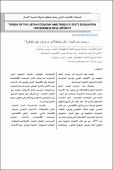Показать сокращенную информацию
Trends of the Libyan economy and tools of state regulation for business development
| dc.contributor.author | Atnishah, R. A. | |
| dc.contributor.author | Sycheva, N. V. | |
| dc.contributor.author | AL-Kamali, M. F. S. H. | |
| dc.coverage.spatial | Sana'a | ru_RU |
| dc.date.accessioned | 2024-12-24T11:39:46Z | |
| dc.date.available | 2024-12-24T11:39:46Z | |
| dc.date.issued | 2024-12-23 | |
| dc.identifier.citation | Atnishah, R. A. Trends of the Libyan economy and tools of state regulation for business development / R. A. Atnishah, N. V. Sycheva, M. F. S. H. AL-Kamali // Al-Andalus journal for Humanities & Social Sciences. – 2024. – Vol. 11, № 110. – P. 132–163. | ru_RU |
| dc.identifier.uri | https://elib.gstu.by/handle/220612/40131 | |
| dc.description.abstract | This study aims to identify weaknesses in the Libyan economy and guide the necessary policies to achieve sustainable development. This study examines the importance of transportation and communications infrastructure in enhancing the business environment and attracting foreign direct investment in Libya, especially in traditional sectors such as banking and tourism. It also emphasizes the need to develop education as a prerequisite for economic diversification, by improving the quality of the education system and providing students with the skills required in the labor market. The study reviews the economic challenges facing Libya after 2011, including over-reliance on the public sector and the weakness of the private sector, and explores the structural reforms needed to achieve sustainable growth. The impact of previous economic policies on the Libyan economy is analyzed and the effects of the popular uprisings on production and GDP are assessed. The study provides strategic recommendations to improve the investment climate and promote private sector growth, with an emphasis on the need for coordination between the public and private sectors in developing education and training programs | ru_RU |
| dc.language.iso | other | ru_RU |
| dc.publisher | Alandalus University for Science and Technology | ru_RU |
| dc.subject | Infrastructure | ru_RU |
| dc.subject | Transport and Communications | ru_RU |
| dc.subject | Foreign Direct Investment | ru_RU |
| dc.subject | Libyan Economy | ru_RU |
| dc.subject | Education | ru_RU |
| dc.subject | Economic Diversification | ru_RU |
| dc.subject | Economic Policies | ru_RU |
| dc.subject | Popular Uprisings | ru_RU |
| dc.subject | Sustainable Development | ru_RU |
| dc.subject | Private Sector | ru_RU |
| dc.subject | Structural Reforms | ru_RU |
| dc.subject | Skills Needed | ru_RU |
| dc.subject | Business Environment | ru_RU |
| dc.title | Trends of the Libyan economy and tools of state regulation for business development | ru_RU |
| dc.title.alternative | اتجاهات الاقتصاد الليبي وأدوات تنظيم الدولة لتنمية الأعمال | ru_RU |
| dc.type | Article | ru_RU |
| local.identifier.doi | 10.35781/1637-000-0110-005 |
